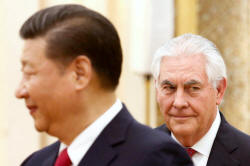|
China prepares to counter
any U.S. trade penalties: sources
 Send a link to a friend
Send a link to a friend
 [March 20, 2017]
By Kevin Yao [March 20, 2017]
By Kevin Yao
BEIJING
(Reuters) - China's government has been seeking advice from its
think-tanks and policy advisers on how to counter potential trade
penalties from U.S. President Donald Trump, getting ready for the worst,
even as they hope for business-like negotiations.
The policy advisers believe the Trump administration is most likely to
impose higher tariffs on targeted sectors where China has a big surplus
with the United States, such as steel and furniture, or on state-owned
firms.
China could respond with actions such as finding alternative suppliers
of agriculture products or machinery and manufactured goods, while
cutting its exports of consumer staples such as mobile phones or
laptops, they said.
Other options include imposing tax or other restrictions on big U.S.
firms operating in China, or limiting their access to China's
fast-growing services sector, they added.
Beijing was a particular target of Trump's rhetoric during last year's
election campaign, and officials see some friction as inevitable due to
China's large trade surplus, according to several sources involved in
the internal discussions.
China's State Council Information Office, the government public
relations arm, and the Ministry of Commerce did not return requests for
comment.

"There is still room for both sides to resolve problems through
co-operation and consultation, rather than just resorting to
retaliation," said a policy adviser who spoke on condition of anonymity.
"But we should have plans in case things go wrong."
Premier Li Keqiang said last week that Beijing did not want to see a
trade war with the United States and urged talks between both sides to
achieve common ground.
U.S. Treasury Secretary Steven Mnuchin also said last week that the
Trump administration did not want trade wars, but that certain trade
relationships needed re-examining to make them fairer for U.S. workers.
No major U.S. measures have been announced, and there were no public
indications of Washington's intentions on trade at the weekend when
Secretary of State Rex Tillerson visited China.
Trump is expected to host President Xi Jinping next month.
A glimpse of the uncertain future, however, came on Saturday in a
communique after a meeting of finance ministers at the G20 in Germany,
which dropped a pledge to keep global trade free and open, acquiescing
to an increasingly protectionist United States after the two-day meeting
failed to yield a compromise.
GOODWILL GESTURE
The sources said China could step up some imports from the United States
and boost its investment there to help create more jobs as a goodwill
gesture, but would not meekly accept any unilateral U.S. action.
[to top of second column] |

China's President Xi Jinping meets U.S. State of Secretary, Rex
Tillerson at the Great Hall of the People in Beijing, China, March
19, 2017. REUTERS/Thomas Peter/File Photo

"We
will have contingency plans to cope with the worst policies from Trump," said a
second policy adviser.
Trump
has previously threatened a 45 percent tariff on China's exports and frequently
said on the campaign trail that he would label China a currency manipulator,
even though Beijing has not been actively weakening the yuan in recent years.
In an interview with Reuters on Feb. 23, he declared China the "grand champions"
of currency manipulation.
"It's hard to say his views have changed or he has become more pragmatic," said
the first adviser.
Mnuchin has pledged a more methodical approach to analyzing Beijing's foreign
exchange practices.
Under
the three criteria set by the U.S. Treasury to determine whether a country is
manipulating its currency for a trade advantage, China only meets one: running a
trade surplus of more than $20 billion with the United States. The U.S.
Treasury's next report on the issue is due in April.
China's surplus with the United States fell by $20.1 billion to $347 billion in
2016, the U.S. Commerce Department said on Tuesday, while Chinese data put it
somewhat lower.
One of the sources said he thought it unlikely that Trump would label China a
currency manipulator.
"If he does that, China will let the yuan go, and the yuan will fall sharply,"
the source said.
Weakening the yuan or dumping some of China's massive holdings of U.S Treasuries
could be considered only when trade relations deteriorate sharply, the sources
said.
Earlier this month, former commerce minister Gao Hucheng said during the annual
meeting of parliament that China was not afraid of a trade war, though it hoped
to avoid one.
"We are willing to deal with it properly, but we are not afraid. Once the U.S.
side take certain measures, we will evaluate and analyze such measures, and take
actions when necessary," Gao said.

(Additional reporting by Elias Glenn; Editing by Will Waterman)
[© 2017 Thomson Reuters. All rights
reserved.] Copyright 2017 Reuters. All rights reserved. This material may not be published,
broadcast, rewritten or redistributed. |